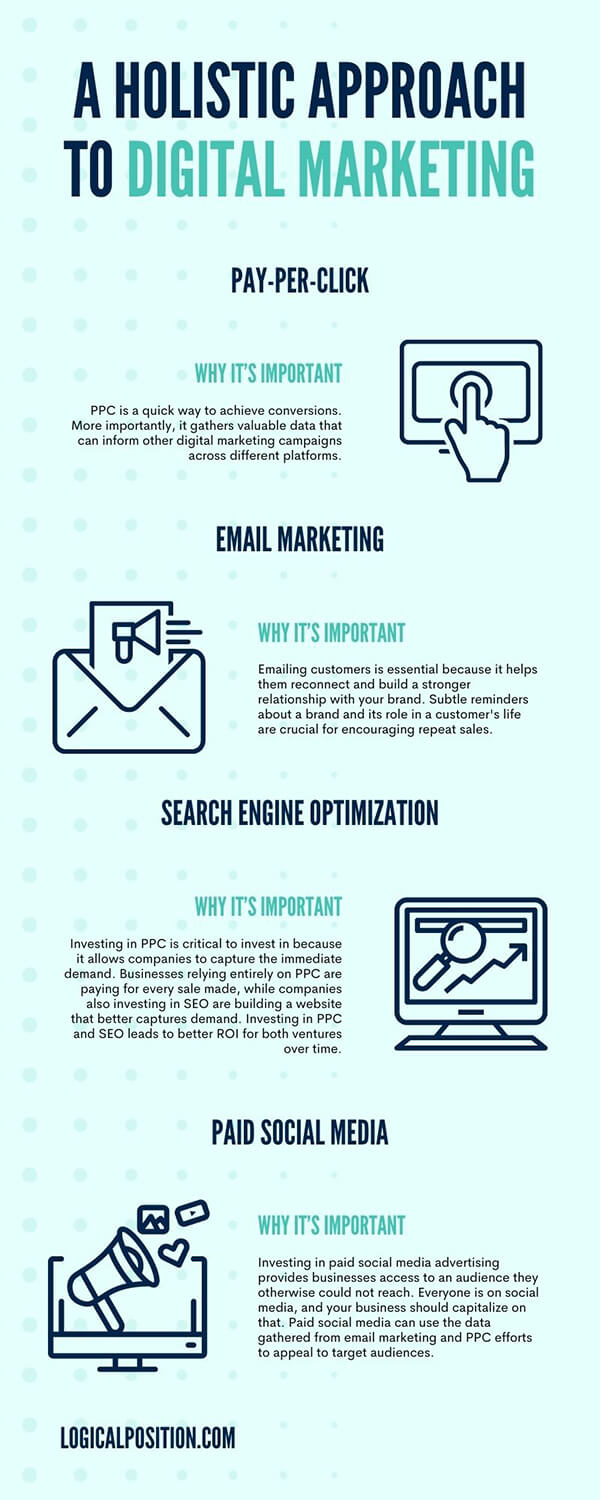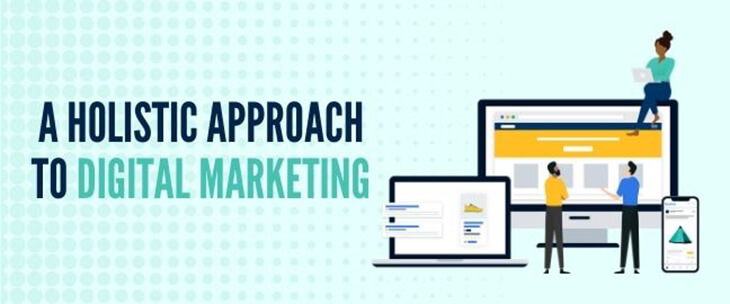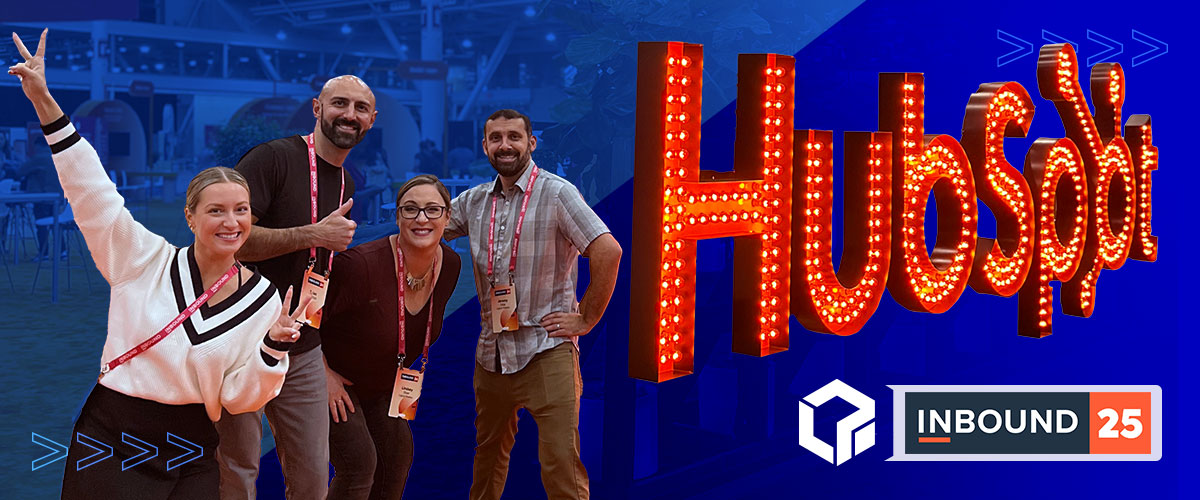Digital marketing is something beneficial for companies across countless industries to invest in. It’s the new go-to way for businesses to achieve their goals. With the global COVID-19 pandemic that hit in 2020, people’s consumption has shifted in a significant way.
There was a turn to online shopping when available and an emphasis on finding products and services exclusively online. This shift creates additional demand for digital marketing for brands to grow their brand awareness, increase conversions, and reach other goals.
While investing in just one form of digital marketing can move a business closer to its goals, taking a holistic approach helps reach its full potential.
Pay-Per-Click
One of the top ways to break into digital marketing is through pay-per-click (PPC) advertising through Google and other leading search engines. These ads typically yield great results when keyword research is correct.
What It Is
Pay per click advertising is where users see an advertisement at the top of the search results for specific pre-determined keywords. The ad-space itself doesn’t cost the company anything. The company investing in PPC ads pays every time a user clicks on the ad.
Basic Guide To PPC
Managing a PPC campaign takes a lot of backend work. Here is a brief guide to starting a PPC campaign:
- Start by conducting keyword research.
- Keyword research helps to determine which keywords to invest in for the best results.
- Continuously evaluate the performance and conversion value of the keywords chosen.
- Invest for the best return on investment without straining your budget.
Running a PPC campaign is possible and often yields fast and robust results when managed diligently.
Why It’s Important
PPC is a quick way to achieve conversions. More importantly, it gathers valuable data that can inform other digital marketing campaigns across different platforms. PPC is great for generating immediate results—but relying on PPC alone isn’t ideal.
Companies may see great ROI for their PPC campaigns, but putting all their eggs in one basket can be detrimental in the long term. Paying for all clicks and conversions can add up. Even with successful PPC efforts, companies can grow more if they invest in organic traffic, brand awareness, and high customer lifetime values.
Email Marketing
Email marketing is a form of digital marketing that effectively builds brand awareness while strengthening a customer/brand relationship. It can also be quite useful for upselling and increasing customer lifetime value.
What It Is
Email marketing is where a company sends out various forms of emails over time to customers who’ve made a purchase before or signed up to receive emails from the company via an email list form. There are many types of emails that businesses can send out, and each serves a unique purpose.
How It Works
Email marketing works by delivering communications to customers who may not regularly check a company’s website for updates. These customers are still potentially interested in knowing more information about it. There are a few different types of emails to look out for.
Emails To Upsell
Emails to upsell are communications sent to customers who have previously made a purchase. The purpose of these email types is to encourage the customer to make another purchase. Here are a few examples:
- You bought “item a,” which pairs well with “item b,” click here to buy now.
- You bought an item that is old or used by now, click here to repurchase.
- You bought “item a.” Other customers who bought “item a” also bought items b,c,d, and e. Click here to shop now.
Emails To Inform
Companies know that customers are not typically going to their website to see what’s new or to look for sales. When a company wants customers to know something, it’s the company’s responsibility to tell the customer in the most convenient way possible. Emails help accomplish this. Businesses send out many informational emails, including:
- Newsletters
- Sale or clearance event reminders
- New product alerts
- Discontinuing products alerts
Emails To Remind
Reminding customers of purchases, important dates, or a brand’s existence is vital for brand awareness and customer lifetime value. Emails sent out to customers can help remind them of things they want to do regarding the company. For example:
- You left an item in your cart; come back to check out now.
- You looked at an item but didn’t put it in your cart. Look again at it and similar items.
- You saved a coupon but didn’t use it. Come back and use it before it expires.
Why It’s Important
Emailing customers is essential because it helps them reconnect and build a stronger relationship with your brand. Subtle reminders about a brand and its role in a customer’s life are crucial for encouraging repeat sales.
Email marketing has one of the highest conversion rates in digital marketing. With email marketing, the people receiving the emails have already previously expressed interest in the business. They have also most likely made a purchase or are thinking about making one. The intent is there already; the emails serve as a gentle yet firm reminder.
Search Engine Optimization
Investing in PPC is a great way to capture the immediate demand. Email marketing is perfect for connecting with an existing customer base. Search engine optimization is a slow-moving process that pays off significantly in the long run. They say slow and steady wins the race, and when talking about SEO, this could not be more true.
What It Is
SEO is a process of optimizing a website to better appeal to search engines to pursue higher rankings for key search terms relating to a business. Based on keyword research, companies work to climb in search rankings. SEO is vital because when a potential customer searches a term related to your business, you want to show up further up on the search results, preferably the first page. People rarely visit the latter pages of Google search results, so investing in SEO is essential for longevity in conversion potential.
How It Works
SEO works for many companies when they put in the diligent effort and understand the patience it takes. It’s a long, continuous effort that yields lasting results. Here are some examples of how SEO works:
- Start with keyword research and determining a list of keywords you will target.
- Integrate those keywords into the content on your website.
- Add tons of informational and quality content onto your website. Blogs are typically the best way to do this.
- Focus on improving your web core vitals for a better user experience.
- Always prioritize user experience.
Why It’s Important
Investing in PPC is critical to invest in because it allows companies to capture the immediate demand. Businesses relying entirely on PPC are paying for every sale made, while companies also investing in SEO are building a website that better captures demand. Investing in PPC and SEO leads to better ROI for both ventures over time. Digital marketing methods work together to create the best possible outcome for businesses.
Paid Social Media
Everybody has a social media account of some sort. With most people on social media in one form or another, the platform provides the broadest and most diverse audience possible. Reaching your target audience is made possible and attainable through social media advertising.
What It Is
While your business can and should create a free profile on social media sites, investing in paid advertising on social platforms helps broaden your audience. Social media advertisements are posts that show up in a person’s regular content feed, embedded with the regular feed.
How It Works
The process is slightly different for each platform. Still, the most beneficial platform to invest in for paid social is Facebook. Facebook has the widest audience available on any social media platform. This platform uses the Facebook Pixel to curate ads for a target audience. There are a few things to keep in mind when setting up a paid social campaign:
- Correctly identifying a target audience determines the success of a campaign.
- Ads need to have high-quality creative content.
- Users are scrolling for their feed; there is no conversion intent, so brand awareness will build before conversions do.
Why It’s Important
Investing in paid social media advertising provides businesses access to an audience they otherwise could not reach. Everyone is on social media, and your business should capitalize on that. Paid social media can use the data gathered from email marketing and PPC efforts to appeal to target audiences.
Paid social media can also help inform a company about the real target audience and how to reach them through email marketing better, and what keywords to target heavier in PPC and SEO efforts.

How Each Channel Works Together
Everything influences everything. Social media, PPC, SEO, and email marketing all help each other through each method’s sales funnel section. Investing in each provides businesses with a better road map to grow and more efficiently capture their current demand.
Take the example of a company that sells coffee mugs:
- SEO captures the people searching for information about coffee drinking, mugs, and related inquiries.
- PPC captures the people actively searching with the intent to purchase a coffee mug.
- Email marketing captures people who bought a mug already but might be interested in another or a related product from the same brand.
- Social media helps create demand by capturing future coffee drinkers, people slowly converting to coffee, and those who want to get started with coffee but need the startup supplies.
A holistic approach to digital marketing allows campaigns to work together to create and capture demand, thus moving it towards key goals.
Why a Professional Digital Marketing Agency Can Help
Taking a holistic approach to digital marketing is time-consuming and requires a great deal of expertise. When you run your own business, your time may be best used elsewhere in the company. Checking on statistics, conducting keyword research, and adapting the marketing plan for your campaign’s channels is time-consuming.
Logical Position offers stand-alone digital marketing packages with experts in all areas. We are an SEO, paid social, email marketing, and PPC marketing agency. Each of our departments is dedicated to working together to help our clients achieve their goals. Contact us today for more information about our services and for a free consultation.




